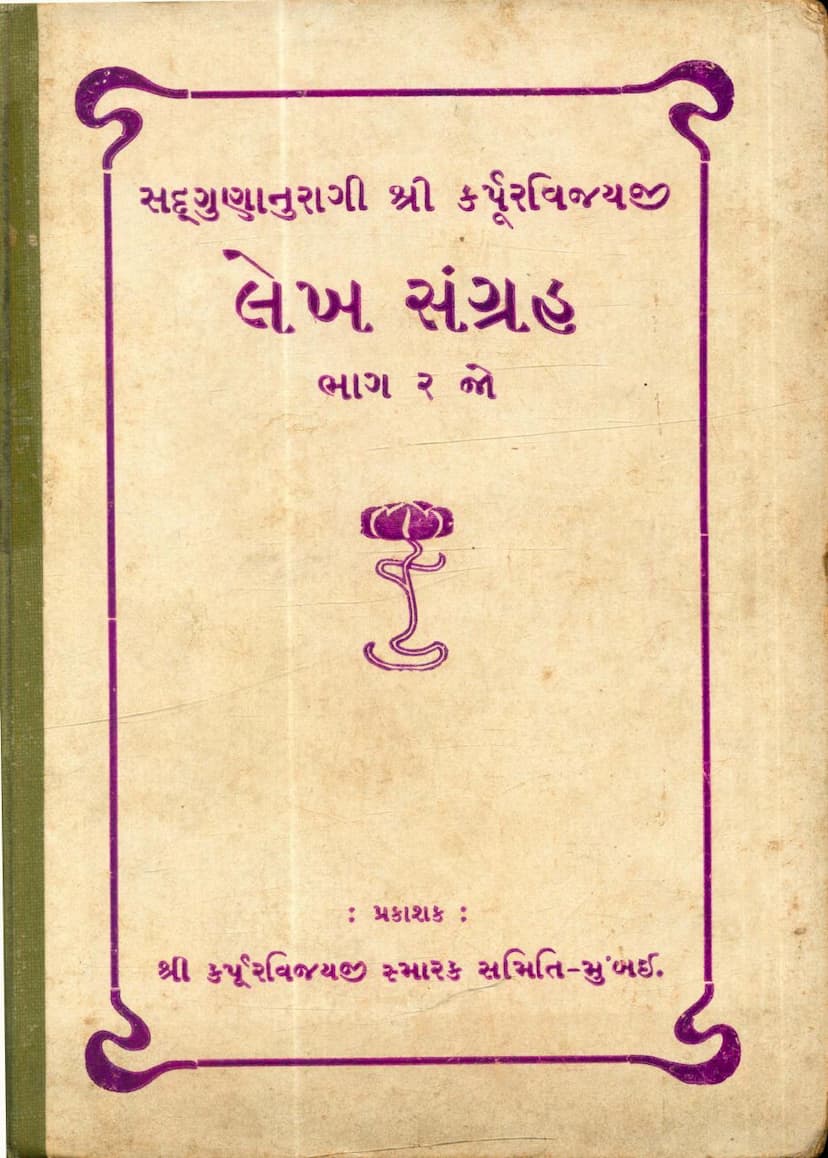Lekh Sangraha Part 02
Added to library: September 2, 2025
Loading image...

Summary
This document is a collection of writings by Muni Shri Kapurvijayji, compiled in two parts. Part 02, published by Shri Kapurvijayji Smarak Samiti, Mumbai, in Veer Samvat 246 and Vikram Samvat 1996, contains a compilation of his articles and discourses.
Key Contents:
- Brief Biography of Muni Shri Kapurvijayji: The book begins with a short biography of Muni Shri Kapurvijayji (born Samvat 1925, initiated Samvat 1947, passed away Samvat 1993). It highlights his virtues of simple living and high thinking, emphasizing that sainthood is not limited by birth or status but attainable through spiritual endeavor. The biography traces his early life, education, and the events that led to his renunciation and his eventual name, Kapurvijay.
- Sukt-Muktaavali (Garland of Gems of Wisdom): This section forms a significant portion of the book, covering various philosophical and ethical topics. It is structured into four categories (vargas) representing the four purusharthas (goals of life):
- Dharma Varga (Class on Righteousness): Discusses 36 principles related to deity, guru, dharma, knowledge, human birth, virtue, justice, promise, forbearance, purity of thought-word-deed, lineage, discretion, knowledge, benevolence, diligence, charity, chastity, penance, spiritual contemplation, abandonment of anger, pride, delusion, greed, compassion, truth, non-stealing, chastity, non-possession, contentment, control of senses, vigilance, righteous conduct of monks and householders, etc.
- Artha Varga (Class on Wealth/Purpose): Covers 16 topics including wealth, contemplation for well-being, wealth, miserliness, begging, poverty, service to the king, friendship with the wicked, seven deadly sins (gambling, meat-eating, theft, intoxication, prostitution, hunting, adultery), fame, chief minister, arts, folly, shame, etc.
- Kama Varga (Class on Desire/Love): Discusses seven topics: desire, qualities and faults of men and women, virtuous women, union and separation, duty towards parents, fatherly affection, and description of a good son.
- Moksha Varga (Class on Liberation): Encompasses 10 topics (more with sub-divisions) including liberation, karma, karma's results, forgiveness, self-control, meditation, twelve reflections (contemplations), renunciation of attachment and aversion, contentment, discretion, detachment, self-realization, etc.
- Updeshak Vakyamrut Sangrah (Collection of Nectar-like Discourses): This section contains approximately 60 articles on various subjects, described as nectar-like and beneficial for the soul.
- Emphasis on Jain Principles: The text strongly emphasizes core Jain principles such as Ahimsa (non-violence), Satya (truth), Asteya (non-stealing), Brahmacharya (celibacy), Aparigraha (non-possession), control of senses, compassion, forgiveness, contentment, and the importance of a virtuous life for attaining liberation.
- Biographical Anecdotes: The biography includes accounts of significant events in Muni Shri Kapurvijayji's life, such as his deep devotion to his parents and guru, his rigorous spiritual practices, his extensive travels (vihars), and his encounters with notable figures like Mahatma Gandhi.
- Literary Style: The text is written in Gujarati, often using poetic meters like Malini Vritta and Shardulvikridita for philosophical discourse, making the spiritual teachings accessible and engaging.
- Publication Context: The book was published by the Shri Kapurvijayji Smarak Samiti to commemorate the spiritual contributions of Muni Shri Kapurvijayji, with the aim of propagating his teachings.
In essence, "Lekh Sangraha Part 02" serves as a valuable compendium of Jain philosophy, ethics, and spiritual guidance as articulated by Muni Shri Kapurvijayji, offering profound insights into living a righteous and purposeful life leading towards spiritual liberation.